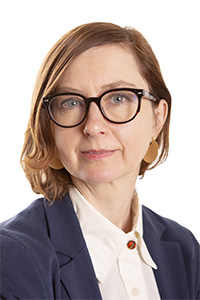How misinformation about wind power spreads
2022-08-31

The recently launched research project Fighting windmills – tracing misinformation about wind power online is part of the larger international research programme Mistra Environmental Communication. Taking on an interdisciplinary perspective, it aims to understand how misinformation about sustainable energy generation emerges and is shaped in society's dominant information infrastructures, and how it relates to other issues and problems.

‘Wind power is part of a larger problem area, climate change and sustainable energy. It is a very important topic, an existential threat that humanity has to face,’ said Jutta Haider, professor and project leader, about the societal benefit of the study.
She draws parallels with the Covid and vaccine debates as clear examples of areas where rumours and misinformation have been spread and done great damage. She believes that with more knowledge about how such dissemination takes place in the field of environmental communication, it will be possible to find ways to bring about change.
Interesting tensions can already be seen
Between now and the election, data will be collected from Twitter and Facebook, and tens of thousands of tweets and posts can already give an indication of the outcome.
‘We are likely to get a result where many interesting tensions are seen in the material. This is a very hot topic,’ said Jutta Haider.
She points out that wind power, nuclear power, the energy situation across Europe, and even the possible impact of wind power on biodiversity are widely debated, not least on social media.
‘A lot of different actors, organisations, interests, information and misinformation are pitted against each other. There is a great deal of polemic, and we are trying to untie some of those knots in order to move forward.’
Likely to find political links
Jutta Haider says it is likely that clear political links will be found, but that it is only speculation so far. What is already clear, however, is that there is one player in the media debate that is invisible and previously unexplored – Google's search engines.
‘People think that they have control over the information they google, but the keywords that come up don't appear out of nowhere. There's an interesting interplay between the people who suggest keywords and the organisations that create the content,’ she said.
Normally, a majority of searches are done in metropolitan areas because that's where most people live, but that's not the case when it comes to wind power. Instead, Gävleborg, Värmland and parts of Norrland currently see the greatest search volume.
‘That's remarkable, it tells us something,’ says Jutta Haider, talking about white spots on the map where mainstream media have no coverage. Something that could open the door for other actors to set the agenda.
‘If there isn't that much content that Google can deliver, there are great opportunities to distribute incorrect information.’
Google's search engines previously unexplored
Highlighting the role of search engines in order to achieve a better understanding of the problem, and thus a better ability to deal with it, is an important aim of the study, which is the first of its kind in Sweden.
‘Nothing similar has been done before. There is very little research in this area.’
The study is researcher-driven, but formulated in consultation with various organisations outside academia, and permeated by collaboration.
‘This is a project that is clearly rooted in community interest and needs.’
The aim is to promote research, but also to provide tools for better understanding of the behaviours of different actors, how misinformation spreads, what conflicts may arise, and the role of algorithmic systems in climate change mitigation.
‘We will be able to see the exact application when the study is completed, but the hope is that the results will be useful to many actors,’ said Jutta Haider.
In addition to professor Jutta Haider, the project’s research team also includes Elisa Tattersall Wallin and Björn Ekström from the Swedish School of Library and Information Science. Participants from SLU (the Swedish School of Agricultural Sciences) are Nora Söderberg and Malte Rödl.
Read more
About Jutta Haider
Research Group Information Practices and Digital Cultures
Project page for Fighting windmills – tracing misinformation about wind power online
Lena Carlsson
Adobe stock. Portrait photo: Suss Wilén

